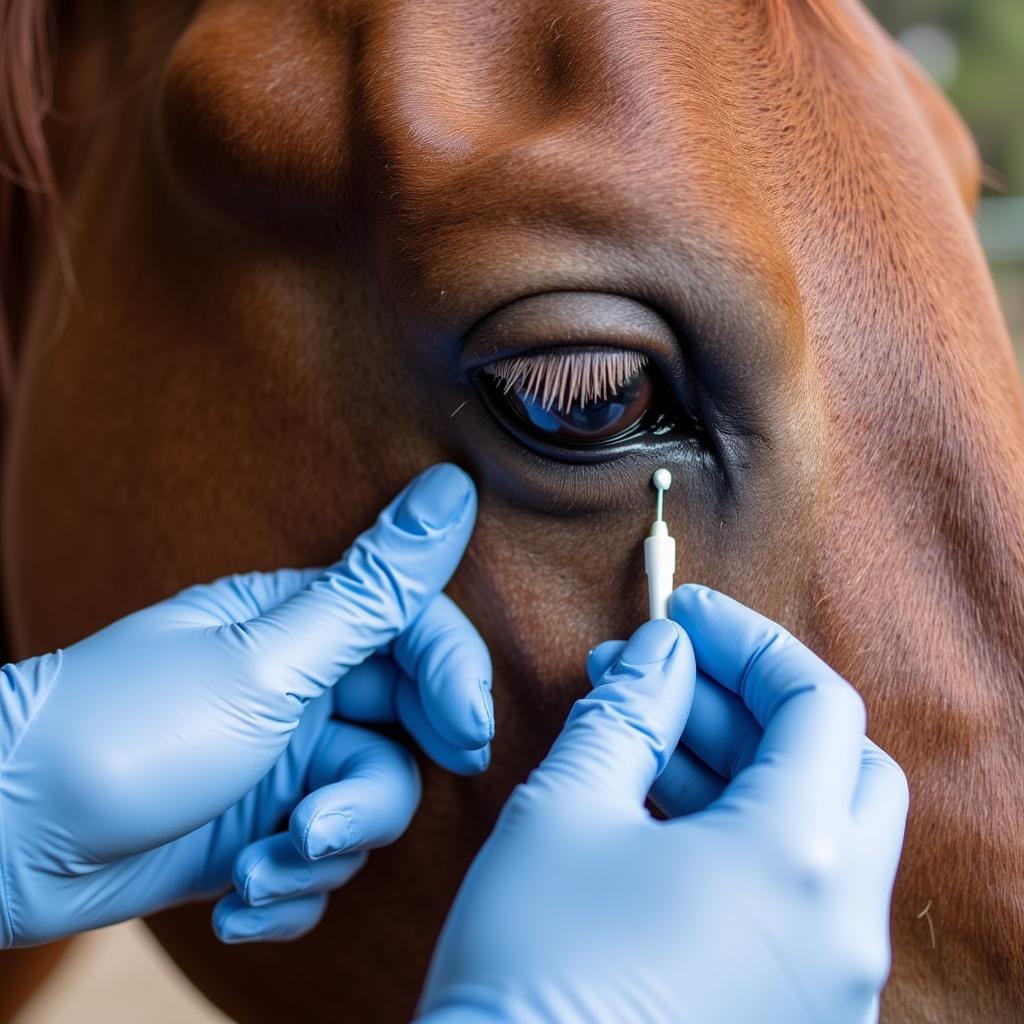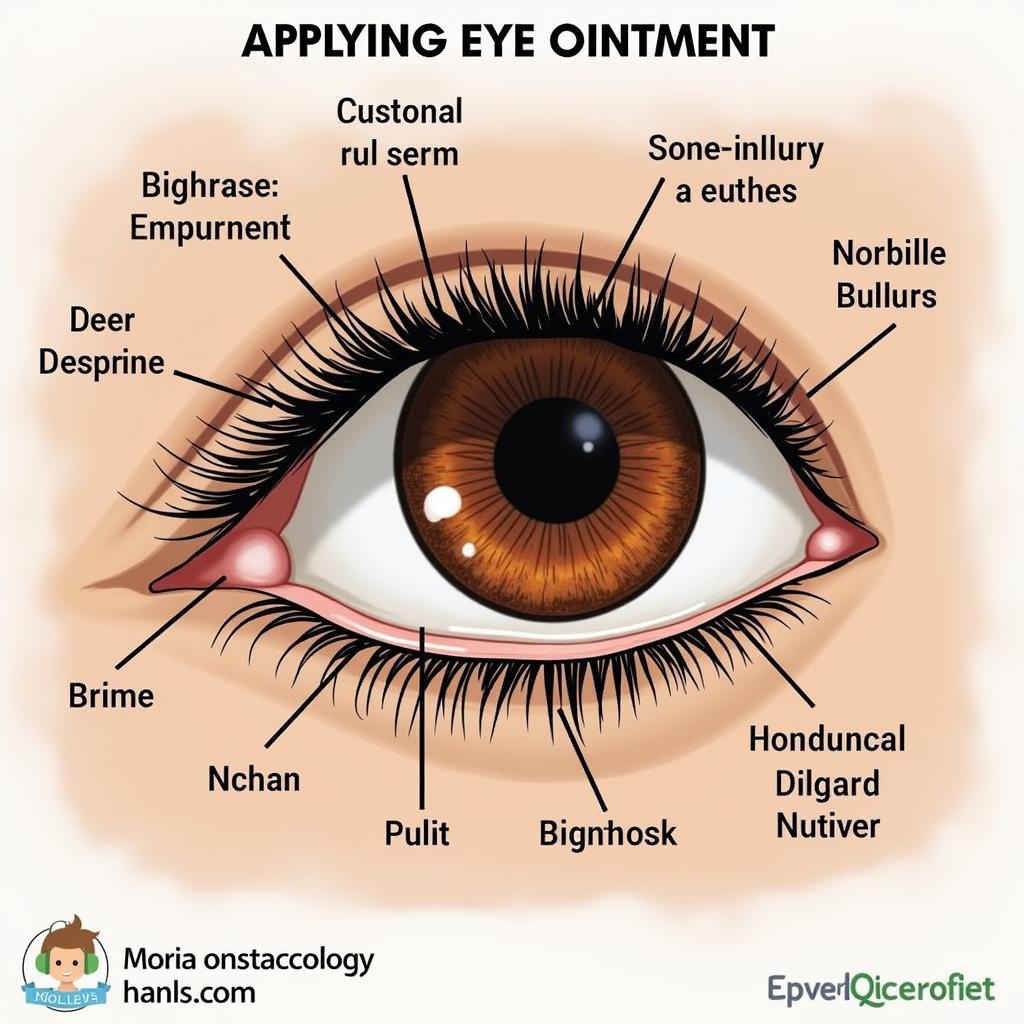Eye Ointment For Horses is a crucial aspect of equine health. Understanding when and how to use these medications can significantly impact your horse’s well-being. From common eye irritations to more serious conditions, knowing the right approach to eye care is essential for every horse owner. This article delves into the various types of eye ointments, their uses, application techniques, and important considerations to ensure the best possible care for your equine companion.
Understanding the Need for Eye Ointment in Horses
Horses, like any other animal, are susceptible to a range of eye problems, from minor irritations like dust and debris to more serious infections and injuries. Eye ointment for horses provides a localized and effective method of delivering medication directly to the affected area. This can help alleviate discomfort, promote healing, and prevent further complications.
Choosing the right eye ointment for horses depends heavily on the specific condition being treated. Some ointments target bacterial infections, while others address fungal or viral issues. There are also lubricating ointments designed to soothe dry or irritated eyes. A veterinarian can accurately diagnose the problem and prescribe the appropriate eye ointment for horses. horse eye swelling can be a symptom of various underlying issues, and using the right ointment can be critical for effective treatment.
Common Eye Conditions Requiring Ointment
Several eye conditions in horses may necessitate the use of eye ointment. These include:
- Conjunctivitis: Inflammation of the conjunctiva, the membrane lining the eyelid and covering the white part of the eye.
- Corneal Ulcers: Open sores on the cornea, the clear front surface of the eye. Treatment for a ulcer in horses eye is crucial for preventing vision loss.
- Eye Infections: Bacterial, viral, or fungal infections affecting various parts of the eye.
- Dry Eye: Insufficient tear production, leading to dryness and irritation.
- Injuries: Trauma to the eye caused by foreign objects, blows, or other injuries.
 Applying Eye Ointment to a Horse
Applying Eye Ointment to a Horse
Types of Eye Ointment for Horses
Various eye ointments are available for horses, each with its specific purpose. Understanding the differences is crucial for effective treatment.
- Antibiotic Ointments: These combat bacterial eye infections.
- Antifungal Ointments: These address fungal infections of the eye.
- Antiviral Ointments: These target viral eye infections.
- Steroidal Ointments: These reduce inflammation and pain. Kenalog for horses is a common example of a steroidal medication, though not specifically an eye ointment.
- Lubricating Ointments: These soothe dry and irritated eyes.
“Choosing the correct eye ointment is paramount for effective treatment,” says Dr. Emily Carter, DVM, specializing in equine ophthalmology. “Using the wrong type of ointment can exacerbate the condition or delay healing.”
How to Apply Eye Ointment to a Horse
Applying eye ointment requires a gentle and careful approach to avoid causing further irritation or injury to the horse.
- Restrain the Horse: Securely restrain the horse to minimize movement during the application.
- Clean the Eye: Gently clean any discharge or debris around the eye with a clean, damp cloth.
- Apply the Ointment: Gently pull down the lower eyelid and squeeze a small amount of ointment into the lower conjunctival sac. Avoid touching the tip of the tube to the eye.
- Close the Eyelid: Gently close the eyelid for a few seconds to distribute the ointment.
 Close-up of a Horse's Eye
Close-up of a Horse's Eye
“Remember, less is more when it comes to eye ointment,” advises Dr. Sarah Miller, an equine veterinarian with over 20 years of experience. “A small amount is usually sufficient to effectively treat the condition.” Ichthammol ointment for horses is another topical medication that can be useful for certain skin conditions, although not for the eye itself.
When to Consult a Veterinarian
While some minor eye irritations may resolve on their own, it’s essential to consult a veterinarian if you notice any of the following:
- Excessive tearing or discharge
- Squinting or blinking
- Redness or swelling
- Cloudiness of the cornea
- Signs of pain or discomfort
- Any changes in the appearance of the eye
Treatment for summer sores in horses is important for skin health, but remember, eye issues require specific attention and different medications.
Conclusion
Eye ointment for horses plays a vital role in maintaining their ocular health. Understanding the various types of ointments, their uses, and proper application techniques is crucial for every horse owner. Always consult a veterinarian for accurate diagnosis and treatment recommendations. Proper eye care can prevent minor irritations from escalating into serious conditions, ensuring your horse’s eyes remain healthy and bright.
FAQ
- How often should I apply eye ointment to my horse? Follow your veterinarian’s instructions precisely.
- Can I use human eye ointment on my horse? No, always use medications specifically formulated for horses.
- What are the signs of an eye infection in a horse? Signs include discharge, redness, swelling, and squinting.
- Can eye ointments cause side effects in horses? Some ointments may cause temporary blurring of vision.
- How can I prevent eye injuries in my horse? Ensure a safe environment free from hazards.
- What should I do if my horse gets something in its eye? Flush the eye with sterile saline solution and contact a veterinarian.
- Can I use expired eye ointment on my horse? No, always use unexpired medication.
For more related information, you may also find our articles on other equine health topics helpful.
When you need support, please contact Phone Number: 0772127271, Email: [email protected] Or visit us at: QGM2+WX2, Vị Trung, Vị Thuỷ, Hậu Giang, Việt Nam. We have a 24/7 customer service team.